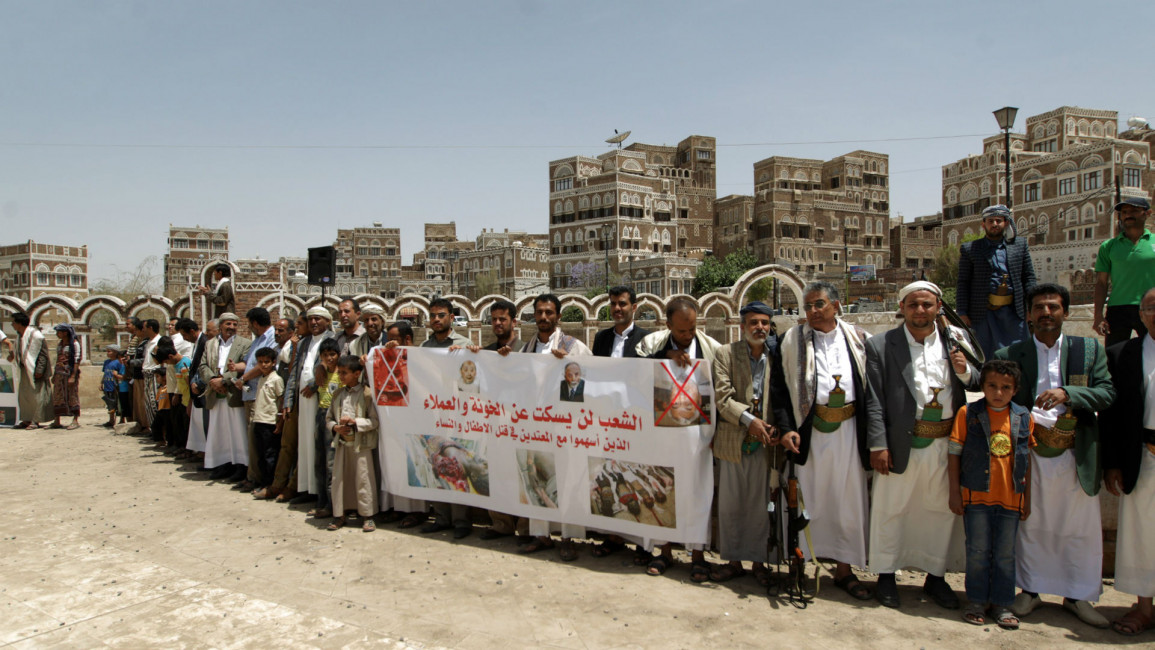540 dead in Yemen as airstrikes continue
At least 540 people have died as a result of the war in Yemen since March 19, the World Health Organisation said on Tuesday.
“More than 540 people have been killed and some 1,700 others wounded by the violence in Yemen since 19 March,” WHO spokesman Christian Lindmeier told journalists, specifying that the toll was up to April 6.
The number of children dead was confirmed at 74 by UNICEF, with the UN body adding that 44 had also been wounded since March 26, and that the number of dead was expected to be far higher. More than 100,000 have been displaced by the violence.
“Children are paying an intolerable price for this conflict,” UNICEF Yemen Representative Julien Harneis said in a statement.
“They are being killed, maimed and forced to flee their homes, their health threatened and their education interrupted,” Harenis said. “These children should be immediately afforded special respect and protection by all parties to the conflict, in line with international humanitarian law.”
The International Red Cross also added their voice, saying that the situation in Aden, which has witnessed heavy fighting over the past few weeks, was “catastrophic”.
“The war in Aden is on every street, in every corner... Many are unable to escape,” said the spokeswoman for the International Committee of the Red Cross in Yemen, Marie Claire Feghali.
18 killed overnight in Aden
At least 18 people were killed overnight in the fighting in the port city of Aden, medical and security sources said, with 53 killed over the previous 24 hours. The fighting in the southern port city has pitted Houthi rebel militiamen and their allies, military units controlled by Yemen's former president Ali Abdullah Saleh, with locals resisting their advance.
The Houthi-Saleh forces have been attempting to take control of the Mualla port in the city.
Saudi-led coalition warships are reported to have shelled Houthi-Saleh positions in Aden, helping to push them back.
Also in the south, armed tribesmen loyal to Yemen's president Abd-Rabbo Mansour Hadi, who has fled to Saudi Arabia, killed eight rebels in an attack on their convoy in Abyan, the provincial governor El-Khedr al-Saeedi said.
Meanwhile, airstrikes on Tuesday by the Saudi-led coalition bombed a military base near Ibb, in central Yemen, Reuters reported. The attack left at least two students from a neighbouring school dead, local pro-Houthi media said.
Overnight, al-Araby al-Jadeed was able to confirm that airstrikes struck the Special Forces base in Sanaa, with the violent explosions heard across the city.
The airstrikes, part of Operation Decisive Storm, also targeted the village of Tikhraf in the Sanhan area, south of Sanaa, the birthplace of Saleh, as well as various locations in Saada province, and al-Anad military base, north of Aden.
Hadi continues to attempt to assert his authority from Riyadh, with his media office announcing several presidential decrees dismissing military commanders who have fought alongside the Houthi-Saleh forces.
Hadi ordered that the army Chief of Staff, General Hassan Khairan, his deputy, Zakariya al-Shami, and the commander of the special security forces, Abdelrazzaq al-Marouni, be dismissed and tried in a military court, along with a number of other military brigade commanders.
The decrees are unlikely to be implemented any time soon, with Hadi remaining out of control of large parts of the country.
Ceasefire proposals
On the diplomatic front, a source told al-Araby al-Jadeed that a new proposal, believed to have been submitted by the United States, was shaped during Security Council consultations on the Yemeni crisis over the Easter weekend. The proposal includes granting international legitimacy to the Saudi-led Operation Decisive Storm in return for a temporary suspension of airstrikes to allow the delivery of humanitarian aid.
A source at the US State Department did tell al-Araby that “the US did not submit any official proposals on Yemen to the Security Council”, but that “it is likely that the proposal came up during unofficial talks among diplomats during the Easter weekend”.
This comes after Russia failed to convince the other permanent UNSC members to adopt a draft resolution calling for “a humanitarian pause” to the Saudi-led coalition airstrikes, while Moscow continued to object to another draft resolution seeking legitimacy for Operation Decisive Storm, submitted by Gulf countries through Jordan.
Yemen's foreign minister, appointed by Hadi, told al-Araby al-Jadeed that a roadmap for the end of the conflict would be presented at a Riyadh Conference that has been called for GCC states.
Riyadh Yassin added that the GCC Initiative which saw Saleh step down in 2011 in exchange for immunity from prosecution could be amended.
“There are some positive points in the GCC Initiative that can be built upon, and after the end of Operation Decisive Storm... there will be a roadmap presented to the Riyadh Conference that is being prepared for,” Yassin said.
The Houthis have rejected proposals for dialogue talks in Riyadh, saying that they should be held in Yemen instead.



